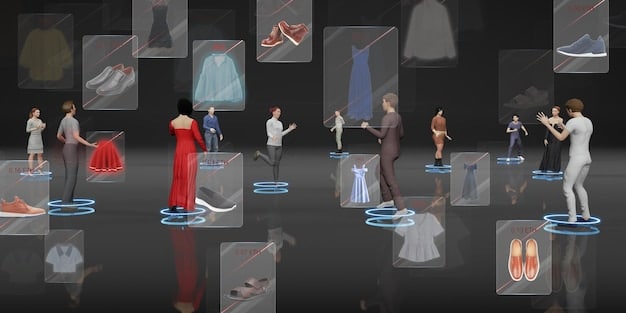Metaverse Marketing: Brands Experimenting in Virtual Worlds for Viral Impact

The Metaverse and Viral Marketing: How Brands Are Experimenting in Virtual Worlds explores innovative strategies companies use within immersive digital environments to achieve viral marketing success, engaging audiences in new, interactive ways.
The intersection of the metaverse and viral marketing presents unprecedented opportunities for brands to connect with audiences in immersive and engaging ways. In this article, we’ll explore the metaverse and viral marketing: how brands are experimenting in virtual worlds to create impactful campaigns that resonate with users and spread rapidly across digital landscapes.
Understanding the Metaverse and Its Potential
The metaverse is rapidly evolving from a futuristic concept to a tangible reality. Understanding its core components and potential is crucial for brands aiming to leverage it for viral marketing.
At its essence, the metaverse represents a convergence of physical and digital realms, creating immersive experiences accessible through various technologies.
What is the Metaverse?
The metaverse is a persistent, shared, 3D virtual world or worlds that are interactive, immersive, and collaborative. It is often accessed through virtual reality (VR) and augmented reality (AR) technologies, but also via traditional devices like computers and smartphones.
Key elements of the metaverse include virtual environments, avatars, digital assets, and social interactions, offering endless possibilities for brands to engage with users in innovative ways.
Potential for Brands
The metaverse offers significant opportunities for brands to connect with their audience in unprecedented ways and create novel marketing experiences. It allows brands to:
- Create immersive experiences that drive brand engagement.
- Launch virtual products and services, opening up new revenue streams.
- Foster community and build brand loyalty through interactive events and spaces.
- Collect valuable user data to refine marketing strategies and personalize interactions.
By embracing the metaverse, brands can stay ahead of the curve and tap into a rapidly growing market.
In summary, the metaverse, with its immersive and interactive environment, presents a fertile ground for brands to experiment with innovative marketing strategies, build stronger relationships with their audience, and achieve viral success.
How Viral Marketing Works in Virtual Worlds
Viral marketing in virtual worlds takes on a new dimension, leveraging the unique characteristics of these immersive environments to amplify brand messages and reach wider audiences.
Understanding the dynamics of viral marketing within the metaverse is essential for brands looking to create impactful campaigns that resonate with users and spread rapidly across digital landscapes.

Key Concepts
In virtual worlds, viral marketing is driven by user-generated content and social interactions. Brands can create engaging experiences that users are naturally inclined to share, leading to organic growth and widespread brand visibility.
Central to this approach is understanding what motivates users to share content. Emotional resonance, novelty, exclusivity, and perceived value are key factors that drive viral marketing success in virtual worlds.
To create viral content in the metaverse, brands should focus on:
- Designing interactive experiences that encourage user participation and sharing.
- Creating valuable virtual assets that users want to own and showcase.
- Fostering a sense of community and belonging within their metaverse presence.
- Leveraging influencers to amplify brand messages and reach wider audiences.
By understanding these dynamics, brands can craft campaigns that resonate with users and achieve viral spread within the metaverse.
Viral marketing in virtual worlds relies on creating experiences that users genuinely want to share. By incorporating elements of emotional resonance, perceived value, and community building, brands can amplify their messages and drive widespread engagement.
Examples of Brands Experimenting in the Metaverse
Several forward-thinking brands have already ventured into the metaverse, experimenting with innovative strategies to connect with their audience and create memorable experiences. Examining these examples provides valuable insights into the potential of metaverse marketing.
These brands are pioneering new ways to engage with consumers, build brand loyalty, and drive viral marketing success.
Nike
Nike has made significant strides in the metaverse, launching Nikeland on Roblox, a virtual world where users can play games, customize avatars with Nike apparel, and connect with other fans. This immersive experience allows Nike to reach a younger audience and promote its products in an engaging and interactive way.
Gucci
Gucci has collaborated with various metaverse platforms to create virtual fashion experiences, including limited-edition digital clothing and accessories that users can purchase and wear on their avatars. These virtual items often command high prices and generate significant buzz, demonstrating the potential of virtual goods in the metaverse.
Coca-Cola
Coca-Cola has launched virtual collectibles and experiences in the metaverse, including NFTs and virtual parties, offering fans unique ways to engage with the brand. These initiatives create a sense of exclusivity and excitement, driving participation and user-generated content.
These examples demonstrate how diverse brands are leveraging the metaverse to create innovative marketing experiences. By experimenting with virtual goods, immersive events, and interactive spaces, they are connecting with consumers in new and impactful ways.
Challenges and Considerations for Metaverse Marketing
While the metaverse offers tremendous potential for viral marketing, it also presents several challenges and considerations that brands must address to ensure success.
These challenges range from technical limitations to ethical concerns, requiring brands to approach metaverse marketing with careful planning and a strategic mindset.

Technical Barriers
Accessibility and usability remain significant barriers to metaverse adoption. High-end VR headsets and powerful computers are still required to fully experience many metaverse platforms, limiting access for a large segment of the population.
Additionally, navigating and interacting within these virtual worlds can be complex and intimidating for new users, hindering adoption and engagement. Overcoming these technical barriers is crucial for brands aiming to reach a broad audience in the metaverse.
Ethical Concerns
Data privacy, security, and user safety are paramount concerns in the metaverse. Brands must ensure that they are collecting and using user data responsibly, protecting users from harassment and exploitation, and promoting a safe and inclusive environment.
Implementing robust security measures and ethical guidelines is essential for building trust and maintaining brand reputation in the metaverse.
Staying Relevant
The metaverse landscape is constantly evolving, requiring brands to stay agile and adapt to new technologies and trends. What works today may not work tomorrow, necessitating continuous experimentation and innovation to remain relevant.
Brands must closely monitor user behavior, feedback, and emerging trends to refine their metaverse strategies and ensure that they are delivering engaging and valuable experiences.
Successful metaverse marketing requires brands to address technical challenges, navigate ethical concerns, and stay adaptable in a rapidly evolving landscape. By prioritizing accessibility, security, and continuous innovation, brands can overcome these obstacles and unlock the full potential of metaverse marketing.
The Future of Viral Marketing in the Metaverse
The future of viral marketing in the metaverse is bright, with emerging technologies and trends poised to transform how brands connect with consumers and create impactful campaigns.
As the metaverse continues to evolve, brands that embrace innovation and prioritize user experiences will be best positioned to achieve viral marketing success.
Emerging Technologies
Advancements in VR/AR technology, artificial intelligence (AI), and blockchain are driving innovation in the metaverse, enabling more immersive, personalized, and secure experiences. These technologies will unlock new possibilities for brands to engage with users and create viral content.
- AI-powered virtual assistants can personalize user interactions and provide tailored recommendations.
- Blockchain technology can enable secure and transparent virtual transactions, fostering trust and incentivizing participation.
- Haptic feedback technology can create more immersive sensory experiences, enhancing engagement and emotional resonance.
Trends to Watch
Several key trends are shaping the future of viral marketing in the metaverse, including the rise of user-generated content, the integration of decentralized autonomous organizations (DAOs), and the emergence of virtual influencers.
- User-generated content will become even more central to viral marketing, as users take on the role of creators and curators.
- DAOs can empower communities to govern virtual spaces and make decisions collectively, fostering a sense of ownership and engagement.
- Virtual influencers can help brands reach new audiences and create authentic connections with consumers.
Personalization
Hyper-personalization will be a crucial component of successful metaverse marketing campaigns. By leveraging data analytics and AI, brands can deliver tailored experiences that resonate with individual users, driving engagement and loyalty.
Providing users with personalized recommendations, offers, and virtual experiences will be essential for cutting through the noise and capturing their attention in the metaverse.
The future of viral marketing in the metaverse hinges on embracing emerging technologies, capitalizing on key trends, and prioritizing personalization. By staying agile, innovative, and user-centric, brands can unlock unprecedented opportunities for engagement and achieve viral success in the evolving digital landscape.
Measuring the Success of Metaverse Marketing Campaigns
Measuring the success of metaverse marketing campaigns requires a shift in thinking, as traditional metrics may not fully capture the unique dynamics of these immersive experiences.
Focusing on engagement, brand sentiment, and user behavior within the metaverse is crucial for evaluating campaign performance and ROI.
Key Metrics
Several key metrics can provide valuable insights into the effectiveness of metaverse marketing campaigns, including:
- Engagement: Track metrics such as time spent in the virtual world, number of interactions with virtual assets, and participation in virtual events.
- Brand Sentiment: Monitor social media and metaverse forums to gauge user sentiment towards the brand and its campaigns.
- User Behavior: Analyze user behavior within the metaverse, such as avatar movement, virtual purchases, and social interactions.
Tools and Techniques
Various tools and techniques can be used to measure the success of metaverse marketing campaigns, including:
- Analytics Platforms: Utilize analytics platforms to track user behavior and engagement within the virtual world.
- Social Listening: Employ social listening tools to monitor brand mentions and user sentiment across social media and metaverse forums.
- Surveys and Feedback: Conduct surveys and gather feedback from users to understand their experiences and preferences.
Attribution Modeling
Develop attribution models to understand how metaverse marketing campaigns contribute to overall business goals, such as brand awareness, lead generation, and sales. This involves tracking the customer journey across both physical and virtual touchpoints.
Accurately measuring the success of metaverse marketing campaigns requires a holistic approach, combining traditional metrics with metaverse-specific indicators. By leveraging analytics, social listening, and attribution modeling, brands can gain valuable insights into campaign performance and optimize their strategies for maximum impact.
| Key Point | Brief Description |
|---|---|
| 🚀 Metaverse Potential | Immersive experiences drive brand engagement. |
| 💡 Viral Dynamics | User-generated content amplifies brand messages. |
| 🚧 Challenges | Technical barriers and ethical concerns need addressing. |
| 🔮 Future Trends | AI, Blockchain, and personalization are key. |
Frequently Asked Questions (FAQ)
▼
The metaverse is a persistent, shared, 3D virtual world or worlds that are interactive, immersive, and collaborative, often accessed through VR/AR or traditional devices.
▼
Brands can create immersive experiences, launch virtual products, foster community, and collect user data to refine marketing strategies in the metaverse.
▼
User-generated content, emotional resonance, novelty, exclusivity, and perceived value are key factors that drive viral marketing success in virtual worlds.
▼
Technical barriers, ethical concerns related to data privacy and user safety, and staying adaptable to the evolving landscape are significant challenges.
▼
Engagement metrics, brand sentiment analysis, user behavior tracking, and attribution modeling provide insights into the effectiveness of campaigns in the metaverse.
Conclusion
The metaverse presents a dynamic and promising landscape for viral marketing, offering brands unprecedented opportunities to connect with audiences in immersive and engaging ways. By understanding the unique dynamics of virtual worlds, addressing the inherent challenges, and embracing emerging technologies, brands can unlock the full potential of metaverse marketing and achieve viral success.





